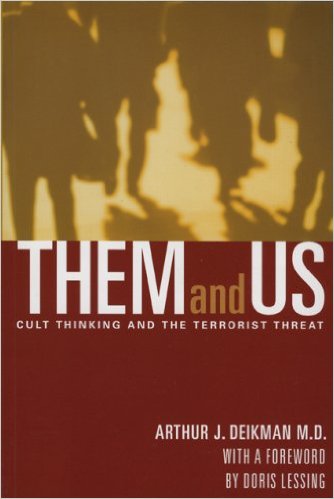
Cult thinking is not something out there—a rare affliction that infects a few people on the margin of society—but a disturbing phenomenon that most of us have experienced in some degree. In Them and Us: Cult Thinking and the Terrorist Threat, author and psychiatrist Arthur Deikman shows the connection between classic cult manipulation and the milder forms of group pressure that can be found in even the most staid organizations—churches and schools, mainstream political movements and corporate boardrooms.
In her foreword, Doris Lessing discusses the implications and repercussions of cult thinking on contemporary society.
About the Author
Arthur J. Deikman, M.D. is clinical professor of psychiatry at the University of California, San Francisco, and author of The Observing Self (Beacon)andPersonal Freedom (Viking). His articles have appeared in numerous professional journals. He serves on the editorial boards of the Journal of Humanistic Psychology and Human Givens. See the author’s website.
Reviews
“In this expansion of his 1990 book The Wrong Way Home, UCSF psychiatry professor Deikman persuasively links cult thinking to patterns of behavior and thought found in everyday life and, with no qualitative differences, to the terrorist groups that threaten that life. He argues that bizarre cults such as those of Jonestown and Waco are not utterly alien, but are extreme forms of behavior and thinking so common that ‘almost all of us might be seen as members of invisible cults.’”
—Publishers Weekly
“In a world of economic uncertainty, terrorist threat, and increasing political polarizations, the ideas presented in Them and Us are incisive, extremely useful, and ultimately forward-looking.”
—Janja Lalich, Assistant Professor of Sociology, California State University, Chico, and author of Bounded Choice
This book expands Arthur Deikman’s earlier work, The Wrong Way Home, a “CHOICE Outstanding Academic Book of 1991.” Critics responded:
“Cult behavior does not occur just in exotic organizations you don’t like: the warped feelings and perceptions that fuel such cults are actually widespread in everyday life and groups.… This is an excellent guide on how to recognize these tendencies in yourself and others, and do something about them.”
—Whole Earth Review
“A highly persuasive, ground-breaking analysis.”
—Booklist
Table of Contents
Foreword by Doris Lessing
Acknowledgements
Introduction
1. The Cult Mirror
A Common Story • The Dependency Fantasy
2. Hugh and Clara: A Case History
3. Compliance with the Group
The Power of Groups • The Threat of Conflicting Loyalties • The Conversion Experience • Oppression by Censure • Degrees of Dependence • Career Realities and Cult Demands • Corporate Culture or Corporate Cult? • Self-Deception and Compliance
4. Dependence on a Leader
Keeping Ourselves Small • The Use and Abuse of Hierarchies • Looking for Leaders • The Fantasy Leader • The Leader’s Fantasy • When Facts Don’t Count • The Draw of Idealism • Up and Down the Corporate Ladder • Unintended Consequences of Power • Submission and Security • The Rewards of Surrender • The Cult Continuum • Dangers in Psychotherapy • Worrisome Practices in Psychoanalytic Institutes • Blind Followers and Blind Leaders • The Power of a Higher Authority
5. Devaluing the Outsider
Devaluation and Projection • The Confidence of the Righteous • The Power of Boundaries • How the Media Portrays “Them” • Seeing the Enemy Abroad • The Cost of Devaluation
6. Avoiding Dissent
Unspoken Boundaries in the Media • Selective Reporting • Advertising’s Covert Indoctrination • Officially Sanctioned Truths • Self-Censorship in the Media • Wanting to Believe Doesn’t Make It So • Who Gets to Choose? • Reinforcing Belief • The Power of Secrecy • The Benefits of Being Contradicted
7. Escape from Cult Thinking
My Own (and Your) Cult Thinking • Official Self-Deception • Illusory Debates • Fostering Dissent • An Uncomfortable Process • The Eye-Level World • Gandhi’s Experiment • Distinguishing the Moral • Going Beyond Dependence
8. The Terrorist Threat
What “They” Think • What “We” Think • Looking for Causes • Looking for Solutions • Coda
